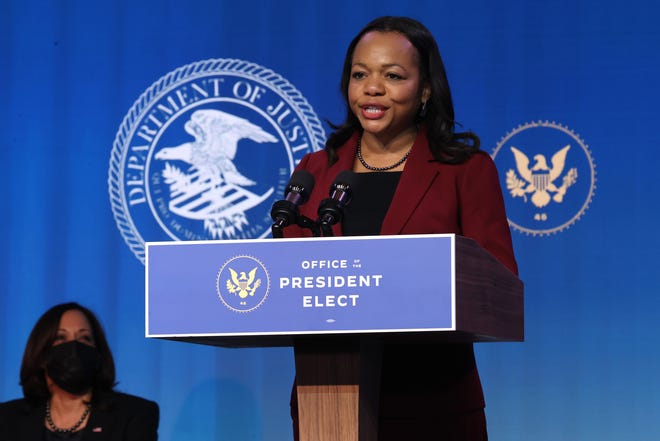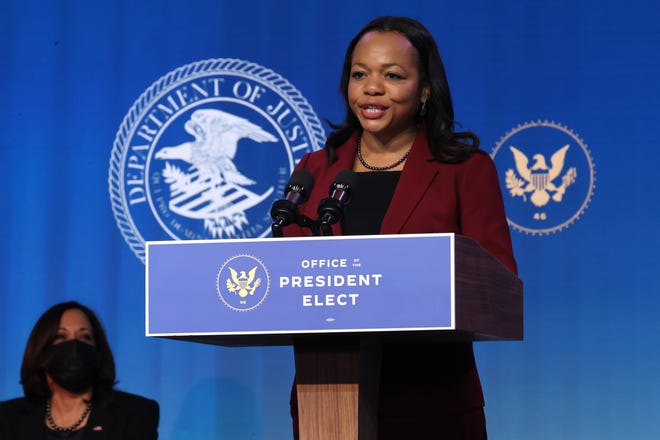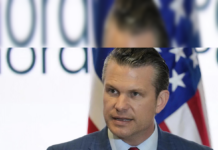
The Justice Department on Tuesday launched a sweeping investigation into the Georgia state prison system plagued by extreme staffing shortages and a culture of violence and neglect in which at least 44 inmates have died by homicide since last year.
Assistant Attorney General Kristen Clarke, chief of Justice’s Civil Rights Division, the said the inquiry was sparked by alarming reports of prisoner-on-prisoner attacks, along with prisoner and staff assaults on gay, lesbian and transgender inmates.
The department’s action expands on an existing federal inquiry started in 2016 that had been focused the sexual abuse of LGBT prisoners.
Earlier this month, the Georgia detention system was named in a federal civil rights lawsuit, alleging “abysmal” conditions inside solitary confinement wings that have “deteriorated past the point of constitutional crisis.”
In the lawsuit, the Southern Center for Human Rights asserted that 70% of the 300 people held in solitary confinement suffered from “serious” mental illness.
“Conditions of confinement… are repulsive,” the civil rights group contended. “Rats and roaches crawl on people while they sleep and crawl in their food. Many cells have no power and defective plumbing. Living areas reek of feces from accumulated human waste in unflushed toilets, whose flushing mechanisms are controlled by staff.
“The conditions are so harsh and isolating — and mental health care is so inadequate —that self-injury and violence are common,” the group alleged. “People subjected to solitary confinement … frequently experience psychiatric crises and become suicidal.”
The Georgia Department of Corrections denied claims that the agency was engaged in a “pattern or practice” of misconduct and neglect, asserting that officials were “committed to the safety of all of the offenders in its custody.”
“This commitment includes the protection of lesbian, gay, bisexual, transgender, and intersex (LGBTI) prisoners from sexual harassment, sexual abuse, and sexual assault,” the agency said in a written statement. “We cooperated fully with the USDOJ’s initial investigation in 2016 and are proud of the service and dedication of our team since then to perform during unprecedented challenges.”
Clarke, while announcing the Justice action, cited the Southern Center’s allegations as among the reports that prompted federal intervention.
Indeed, the federal action comes exactly a year after the Southern Center had called on the department to help “prevent further loss of life.”
In a Sept. 14, 2020 letter to the Trump Justice Department, the center warned of “escalating violence” and large-scale rioting sparked by a lack of food, water and sanitation.
“Videos taken by incarcerated people and readily available on the Internet show extreme deprivations – injured prisoners covered in blood, prison dorms with no security supervision, groups of men roaming lockdown dorms armed with machetes, and cells with no running water or functioning toilets,” the center said, adding that staff vacancies were running at nearly 30%.
Sara Totonchi, the Southern Center’s executive director, said the group is “deeply grateful” for the Justice action.
“This is a significant step in our ongoing struggle for accountability for the lives that have been lost and for the people who continue to suffer behind the walls,” Totonchi said.
The assistant attorney general described the Georgia investigation as a “top priority” for the department.
“The Justice Department’s investigations into prison conditions have been successful at identifying systemic constitutional violations and their causes, fixing those causes and stopping the violations,” Clarke said, referring to recent examinations in Alabama and New Jersey. “We are investigating prison violence and abuse in Georgia’s prisons to determine whether constitutional violations exist, and if so, how to stop them.”
.








